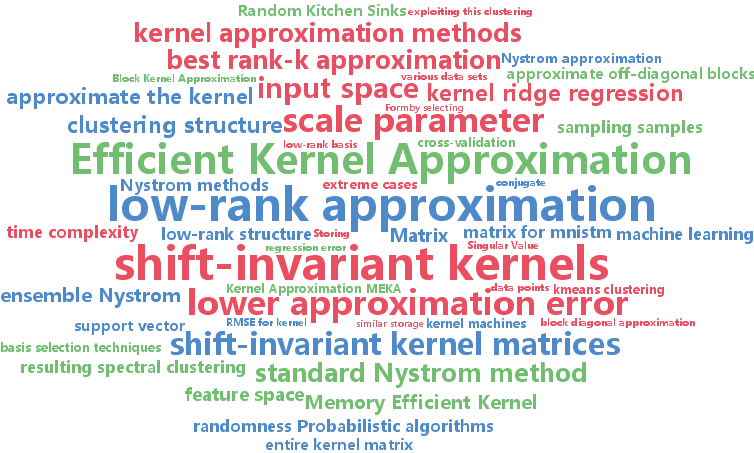shift-invariant kernels
-
Jiyan Yang and Vikas Sindhwani and Haim Avron and Michael Mahoney
Quasi-Monte Carlo Feature Maps for Shift-Invariant Kernels (pdf)
We consider the problem of improving the efficiency of randomized Fourier feature maps to accelerate training and testing speed of kernel methods on large datasets. These approximate feature maps arise as Monte Carlo approximations to integral representations of shift-invariant kernel functions (e.g., Gaussian kernel). In this paper, we propose to use Quasi-Monte Carlo (QMC) approximations instead where the relevant integrands are evaluated on a low-discrepancy sequence of points as opposed to random point sets as in the Monte Carlo approach. We derive a new discrepancy measure called box discrepancy based on theoretical characterizations of the integration error with respect to a given sequence. We then propose to learn QMC sequences adapted to our setting based on explicit box discrepancy minimization. Our theoretical analyses are complemented with empirical results that demonstrate the effectiveness of classical and adaptive QMC techniques for this problem.
-
Si Si and Cho-Jui Hsieh and Inderjit Dhillon
Memory Efficient Kernel Approximation (pdf)
The scalability of kernel machines is a big challenge when facing millions of samples due to storage and computation issues for large kernel matrices, that are usually dense. Recently, many papers have suggested tackling this problem by using a low rank approximation of the kernel matrix. In this paper, we first make the observation that the structure of shift-invariant kernels changes from low-rank to block-diagonal (without any low-rank structure) when varying the scale parameter. Based on this observation, we propose a new kernel approximation algorithm -- Memory Efficient Kernel Approximation (MEKA), which considers both low-rank and clustering structure of the kernel matrix. We show that the resulting algorithm outperforms state-of-the-art low-rank kernel approximation methods in terms of speed, approximation error, and memory usage. As an example, on the MNIST2M dataset with two-million samples, our method takes 550 seconds on a single machine using less than 500 MBytes memory to achieve 0.2313 test RMSE for kernel ridge regression, while standard Nystr\{o

